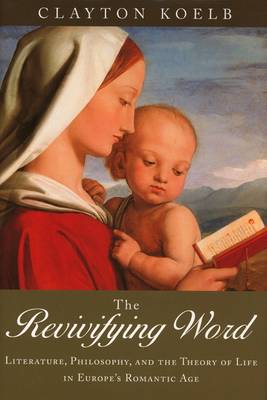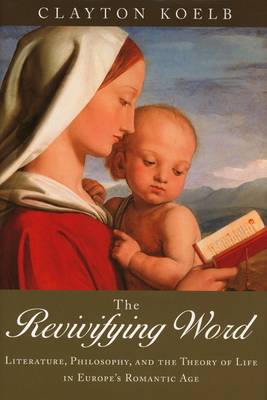
En raison d'une grêve chez bpost, votre commande pourrait être retardée. Vous avez besoin d’un livre rapidement ? Nos magasins vous accueillent à bras ouverts !
- Retrait gratuit dans votre magasin Club
- 7.000.000 titres dans notre catalogue
- Payer en toute sécurité
- Toujours un magasin près de chez vous
En raison de la grêve chez bpost, votre commande pourrait être retardée. Vous avez besoin d’un livre rapidement ? Nos magasins vous accueillent à bras ouverts !
- Retrait gratuit dans votre magasin Club
- 7.000.0000 titres dans notre catalogue
- Payer en toute sécurité
- Toujours un magasin près de chez vous
The Revivifying Word
Literature, Philosophy, and the Theory of Life in Europe's Romantic Age
Clayton Koelb
115,45 €
+ 230 points
Description
Reading as key to the mysterious relation between lifeless material bodies and living, animate beings in Romantic fiction and thought. What is not Life that really is? asked Coleridge, struggling, like many poets, philosophers, and scientists of Europe's Romantic age, to formulate a theory of life that explained the mysterious relation between dead material bodies and living, animate beings. Romantic intellectuals found a key to this mystery surprisingly close at hand: the process by which dead matter could come to life must be something like the process of reading. The Revivifying Word examines the reanimating acts of reading that became a central focus of attention for Romantic writers. German theorists, building on the Apostle Paul's assertion that the dead letter can be revivified by the livingspirit, proposed a permeable, legible boundary between the living and the dead. This inaugurated a revolution in European aesthetics, implanting the germ of an extraordinarily productive narrative idea that enriched Romantic literature for decades. Poets and novelists created a large cast of characters who crossed the boundary between death and life with the help of some form of reading: figures like Keats's Glaucus, Kleist's Elizabeth Kohlhaas, Shelley'sFrankenstein (and the monster he creates), Maturin's Melmoth, Poe's Madeline Usher, and Gautier's Spirite. Clayton Koelb demonstrates that such fictions offer a nuanced consideration of the most urgent question facing any theoryof life: how do material bodies come to acquire, to lose, and then perhaps to regain the immaterial intellectual/spiritual quality that defines animate beings? Clayton Koelb is Guy B. Johnson Professor of German, English, and Comparative Literature and Chair of the Department of Germanic Languages and Literatures at the University of North Carolina, Chapel Hill.
Spécifications
Parties prenantes
- Auteur(s) :
- Editeur:
Contenu
- Nombre de pages :
- 219
- Langue:
- Anglais
- Collection :
- Tome:
- n° 26
Caractéristiques
- EAN:
- 9781571133885
- Date de parution :
- 01-10-08
- Format:
- Livre relié
- Format numérique:
- Genaaid
- Dimensions :
- 157 mm x 234 mm
- Poids :
- 521 g

Les avis
Nous publions uniquement les avis qui respectent les conditions requises. Consultez nos conditions pour les avis.






